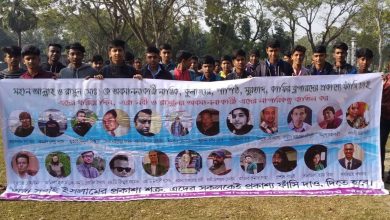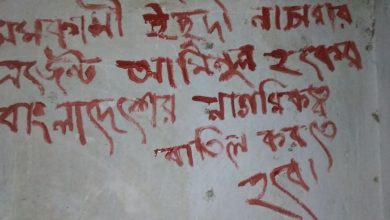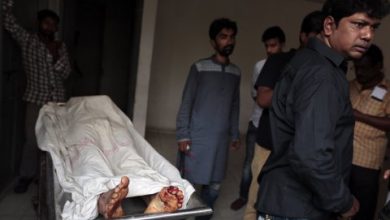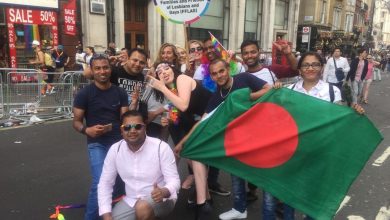AsiaBangladesh
Not in the 2013 hit list, still bloggers are getting murdered!
Blogger killings in Bangladesh
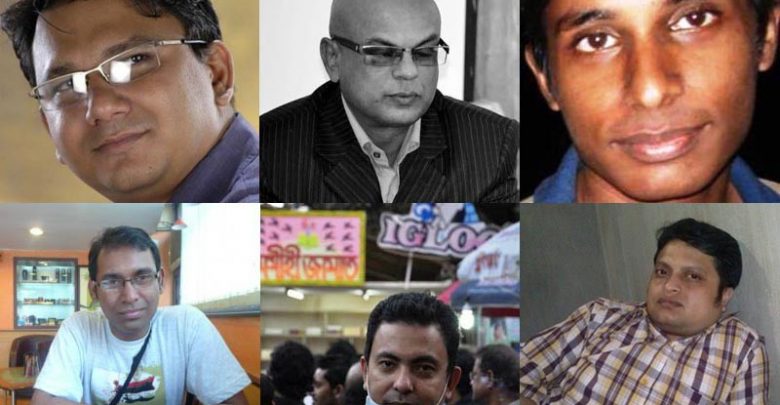
Shahadat Hosain/London
The primary task of a blogger is to produce a content in the form of articles of their own thought, some chose this path so their voice comes across to the general public as it is easier for them to reach millions of readers digitally. Readers who read these articles online put their thoughts as a comment after reading it, thus these become viral very easily.
Almost all atheist Bloggers express their thoughts about religion or faith online, as most of them fear for their life if they come open to the general public. Still, they are not safe.
In 2013 a hit list was published after a conservative group Hefazat-e-Islam, staged two large rallies in Dhaka, demanding capital punishment for every “atheist blogger.” The list began circulating online and printed news media, 84 people were the target. Slowly all the targeted people became aware that their life is in danger. Several people were murdered from the list, the rest hid to survive and some fled the country, but it did not stop there.
Today even people who are categorised as ‘modern’ who doesn’t practice religion are also under great threat, there is no investigation for people who are murdered for being secular from the authority. The government made a lot of promises which weren’t kept, even ignored when it was time to act.
Shahjahan Bachchu, freethinking writer, owner of Bishaka Prokashoni, and editor of the “Amader Bikrampur” weekly magazine was never on any hit list but was murdered on 11 June 2018. Two and a half years after his death the murder investigation is still ongoing, the suspects are never arrested; either they are encountered or they are on the loose.
Since 2013, 30 people have been murdered. They were from all faiths and social backgrounds, linked above all by the manner of their deaths, at the hands of men wielding machetes, knives and even swords. At least three others barely escaped assassination attempts, surviving with scars on their faces and necks that look like medieval battle injuries.
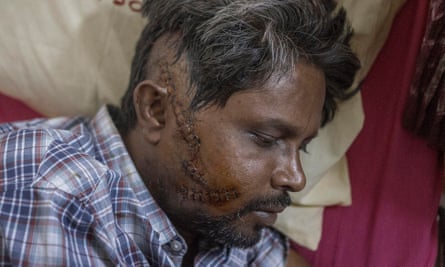
The toll is tiny in absolute terms for a country of around 160 million people, and authorities insist they have the upper hand in the battle against what they describe as a relatively small, unprofessional band of fanatics, pointing to dozens of arrests. On Saturday, after the latest killing, security forces rounded up 1,600 people in a show of strength, although they admitted that only 37 of the detained were suspected Islamist militants, and the rest were petty criminals, AP reported.
“If they think they could turn Bangladesh upside down, they are wrong,” prime minister Sheikh Hasina told parliament before the raids.
But the brutality has thrown daily life out of kilter in disturbing ways, pushing the country towards the conservatism and religious monoculture that the attackers apparently seek.
At the country’s second-largest university, where Siddiquee taught, professors are curtailing classes out of fear of their own students. Authorities have received a hit list of around 40 professors, and some have received threats by phone and letter.
A week after Siddiquee’s killing, three men on a motorbike roared into the village of a Hindu tailor, Nikhil Joarder, hacked him to death, and threw his body in a ditch. Again, they struck in the middle of the day, on the main road lined with shops and homes, but his former friends and neighbors all insist that no one saw the faces of his killers.
Despite the government’s promise of swift justice and a string of arrests, such attacks have, if anything, gathered pace. So far in June, four people have been murdered: two Hindus, a Christian trader, and the wife of a senior police officer tasked with stopping militants, a cross-section of Bangladeshi society. As the list of victims has lengthened, so has the sense of menace across the country.
The first attacks targeted only prominent secular intellectuals, a tiny and easily identified group. Few people are ready to take a prominent public stand against religion in a country where Islamist groups have deep roots and where there is a devout Muslim majority.
After killers circulated the bloggers’ work beyond its original audience, outrage dimmed to apathy among many people, who considered the attacks reasonable punishment for what conservative Islam deems a capital crime. The nominally secular government did little to dispel the impression that the killings were disturbing but a minority concern. Hasina’s government is waging a bitter political battle against Islamist and conservative opposition groups, and is apparently unwilling to risk popular support with a fierce defence of unpopular radicals.
There are hundreds of murders and no one is accounted for, and they are not even in the hit list. It is such a shame that people who express their thoughts or raise awareness on issues like LGBT, atheism, or anything against religion today are hiding for the fear of their own life. Some fled the country long before still is not comfortable coming back home to their families. Quazi Wahiduzzaman, Adnan Saqib, Sujan Chandra Dev, Syed Isteak Hossain Shawon, Biplob Paul, Arman Ahmed lot of activists are today living abroad and cannot reunite with their families.
‘’I cannot think I will be ever able to see my parents or visit the country where I was born, though I am used to these constant threats as these kept coming every day for the last 4/5 years’’ says Adnan. ‘The threats are sometimes for me and sometimes for my family, there is nothing called freedom of thought back home, anything that goes against the so-called culture is being violated in Bangladesh. Everyone is afraid of speaking the truth. I do not think in any way I will be alive if I go back to Bangladesh’’.

